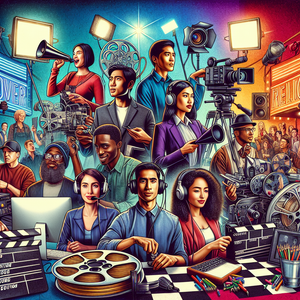
Exploring 15 Stable and Rewarding Careers in the Film Industry: A Pathway to Success
The film industry is a captivating realm that offers a plethora of career opportunities beyond the glitz and glamour often associated with it. While many envision themselves as directors or actors, numerous fulfilling roles exist behind the camera, each crucial to the storytelling process. This guide aims to illuminate these diverse paths, highlighting how they contribute to the industry and offering insights into their stability and rewards. As the film and video production sector continues to grow, now is an opportune moment to delve into a career in this vibrant field.
Job Summaries:
Production Designer:
- Production designers are responsible for creating the visual blueprint of a film.
- They collaborate with directors to design sets that encapsulate the narrative's essence.
- A degree in art or design is typically essential for this pivotal role.
- A robust portfolio is also essential for this role.
Sound Designer:
- Sound designers shape the auditory experience of a film.
- Crafting and editing sound effects.
- Managing audio recordings.
- Mastery of audio engineering and editing software is crucial.
- This role is both challenging and rewarding.
Production Assistant (PA):
- As the backbone of any film set, production assistants provide vital support across departments.
- This entry-level position demands strong organizational skills and a genuine passion for film, often serving as a springboard for career advancement.
Film Editor:
- Film editors play an integral role in post-production.
- They assemble footage and mold the film's narrative.
- A degree in film or a related field is usually required.
- Proficiency in editing software is usually required.
- An innate understanding of storytelling is important.
Camera Operator:
- Camera operators are tasked with capturing the visual narrative.
- Transforming scripts into captivating visuals.
- This role necessitates technical knowledge of camera equipment.
- A strong understanding of lighting and composition is required.
- Often requires a background in film or photography.
Line Producer:
- Line producers oversee the practical aspects of film production.
- They ensure that projects adhere to budgets and schedules.
- A background in film production or project management is beneficial.
- Exceptional organizational and communication skills are important.
Cinematographer (Director of Photography):
- Cinematographers are responsible for the film's visual storytelling.
- They work closely with directors to determine the film's aesthetic.
- Typically, a degree in cinematography and extensive experience are necessary.
- A keen artistic sensibility is also important.
Costume Designer:
- Costume designers curate the wardrobe.
- They define characters and the story's setting through fashion.
- A degree in fashion or costume design is often required for this creative role.
- A strong sense of style is often required for this creative role.
Casting Director:
- Casting directors scout and select actors.
- Conducting auditions and managing contracts.
- A background in talent management or theater is advantageous.
- Strong communication skills are essential for success.
Visual Effects (VFX) Artist:
- VFX artists enhance footage with digital effects during post-production.
- A solid foundation in computer graphics and proficiency in software like Adobe After Effects are typically necessary.
- A degree in visual effects or animation is typically required.
Script Supervisor:
- Script supervisors ensure continuity during filming.
- Guaranteeing that scenes align with the script.
- This role requires meticulous organizational skills.
- A deep understanding of storytelling is essential.
- Often benefits from on-set experience.
Art Director:
- Art directors manage the artistic elements of a film.
- They collaborate with production designers to develop the film's visual style.
- A degree in art or design is often required.
- Strong leadership capabilities are necessary.
Gaffer:
- As head electricians on set, gaffers handle lighting and equipment, playing a critical role in setting the film's mood.
- A technical background in lighting systems is essential, alongside hands-on experience.
Location Manager:
- Location managers scout and secure filming locations, ensuring they align with production needs.
- Strong negotiation and organizational skills are vital, along with experience in location scouting.
Makeup Artist:
- Makeup artists create character looks through makeup and special effects.
- A background in cosmetology or theatrical makeup is typically required.
- A strong portfolio showcasing previous work is essential.
The film industry is teeming with stable and rewarding career paths suited to individuals of various skill levels and interests. By understanding the responsibilities and requirements of each role, aspiring professionals can better navigate their options within this dynamic field. If you're intrigued by these positions, consider checking out current job openings or industry resources to help you embark on your journey. The film industry transcends mere entertainment; it embodies a passion for storytelling and a collaborative spirit that brings narratives to life. Embrace the opportunity to contribute to this fascinating world—your journey in film awaits!
Explore More Jobs

